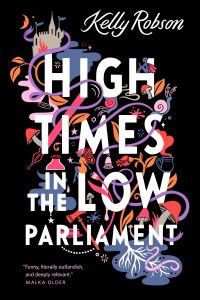Alvaro Zinos-Amaro Reviews Vivid Tomorrows: On Science Fiction and Hollywood by David Brin
 Vivid Tomorrows: On Science Fiction and Hollywood, David Brin (McFarland 978-1-4766-8338-6, $29.95, 241pp, tp) March 2021.
Vivid Tomorrows: On Science Fiction and Hollywood, David Brin (McFarland 978-1-4766-8338-6, $29.95, 241pp, tp) March 2021.
In addition to his well-established body of fictional work, David Brin has been writing genre-related non-fiction since the 1980s. More recently, he co-edited the anthologies King Kong Is Back! An Unauthorized Look at One Humongous Ape (2005) and Star Wars on Trial (2006) – his contributions to both of which are reprinted here – and authored a retrospective collection titled Through Stranger Eyes: Reviews, Introductions, Tributes & Iconoclastic Essays (2008). “Iconoclastic” evokes the tone of many of the pieces in this book – as do the words “on trial” from that Star Wars anthology. Throughout 23 essays split into five sections and drawing on 30 years of writing, Brin examines the ideas, attitudes, and purported values of dozens of science fiction movies, along with many novels, and opines vigorously on their relationship to certain bedrock notions and mechanisms that he associates with “western civilization.” Brin energetically engages with popular franchises such as Star Wars and Lord of the Rings, but doesn’t neglect smaller-scaled fare like Robot & Frank and Annihilation. Many of the films are grouped thematically – immortality-related narratives, for instance, or stories about robots and AIs – and some, like 2001: A Space Odyssey, The Matrix, or Avatar, receive their own dedicated analyses.
Recurring concepts are the ability of dystopias to act as self-preventing, or better yet, self-forestalling prophecies, how a majority of commercial films fall back on variations of the “idiot plot” (its four central manifestations being “1. No institution works. 2. Focus on demigods. 3. Hoard the wonder. 4. Despise your neighbors”), and Hollywood romanticizing idealized pasts rather than flexing its imaginative muscles to envision aspirationally complex and hopeful futures. Brin makes it a point to call out any work that he believes insults the audience’s intelligence (“The reflex to ‘dumb down’ is even more prevalent in cinema, from George Lucas to James Cameron to Peter Jackson. Only a few filmmakers [e.g. Spielberg and Zemeckis and Nolan] avoid the ‘stupid-trap’ with any consistency).” Besides covering genre history in an entertaining and breezy manner, and providing an avowedly “quirky” list of recommendations, he devises several reframing exercises, such as “Name That Villain,” that open up fresh and fun reinterpretations of well-known movies like E.T. the Extra-Terrestrial. His likes and dislikes are readily gleaned. “Arguably the best motion picture ever made, though only marginally science fiction, was Dr. Strangelove, or How I Learned to Stop Worrying and Love the Bomb (1964)”; 300, however, “forges into territory that we haven’t seen since the propaganda machine of 1930s Germany.” Lucy is “excellent” but Star Wars‘s Yoda is “one of the most horrid creatures ever to snarl at us from the silver screen.” The legs on which films stand occupy shifting scales. Of Never Let Me Go, for example, Brin writes: “While moving and thought-provoking, in its way, the film is deemed frustrating by those who want logic in their science fiction.” Regarding Ex Machina: “Although Ex Machina presents a few moments of intellectual heft, and there’s genuine acting, the film distills into a chain of barely connected tropes, including the myth of an isolated magician in his tower – when scientific and technological advances simply do not happen that way.”
Many of these pieces would make for fun cocktail conversation starters, and given Brin’s social longevity in the field, they no doubt have. The writing style is chatty, punchy, exhortative (you’ll find exclamation marks on almost every page!) and ladled with laments (plenty of “ohs” and “ahs”). Brin acknowledges upfront that there is an inevitable amount of repetition due to the range of original publication venues, and he also cheerfully concedes the zeal of his positions, describing some of his takes as “rants” and even subtitling part three of the book as “grinding axes.” I get the impression that Brin’s specialty is affixing movies to a kind of cross where the supporting vertical beam comprises espoused civilizational merits and the lighter horizontal plank acknowledges craft. This rubric is ideal for painting movies in broad strokes. Once in a while the schema is tested: with Dune, for example, the audience seems to be drawn in by the very ideas that Brin believes Herbert’s multi-volume epic was subtly opposing. The resolution? “Frank Herbert was testing us!”
Brin seems to wish that more filmmakers would demonstrate an appreciation of the societies that engendered them (“…it is understandable – if a bit ungrateful – that romantics like George Lucas rage against the modern world, while accepting every fruit”), championing democracy, science, intelligence, and egalitarianism through their stories. His approach is consistently consequentialist. As a result, Brin’s evaluations of art are deeply and admirably embedded in a humanistic and thoroughly moral context. But there’s a kind of reductionism at work too, which tends to miss precisely those elements that make cinema aesthetically distinct from other art forms. When discussing the film adaptation of his own novel, The Postman, he does offer brief thoughts on the movie’s score and visuals, but this kind of specificity is largely absent elsewhere. Brin summarizes his response to The Postman like this: “Watching Kevin Costner’s three-hour epic is a bit like having a great big Golden Retriever jump on your lap and lick your face, while waving a flag tied to its tail. It’s big, floppy, uncoordinated, over-eager, sometimes gorgeous – occasionally a bit goofy – and so big-hearted that something inside of you has to give… that is, if you like that sort of thing.” He uses the same Golden Retriever image when expressing his approbation for The Fifth Element (“Luc Besson’s sheer pleasure at making this film leaps onto your lap like a great big, floppy-dumb retriever and licks your face for 90 minutes, punctuating all the jubilantly eager action with… an aria!”) I think this outlines his basic attitude as a filmgoer: skeptical of what he considers harmful propositions, implicit or explicit, but ready to be won over by the right amount of exuberance and spectacle.
The Brin that emerges from these essays strikes me as doctrinaire, not regarding a particular artistic standard, school of filmmaking, or content per se, but rather to the notion that the effect that Hollywood science fiction has on its viewers – whether salutary, in the sense of being consistent with promulgating Brin’s preferred Enlightenment values, or unsound, in its assumed repudiation of modern civilization – tends to be the chief measure of its worth. This emphatically functional approach leads to many spirited, sometimes perplexing, but frequently eye-opening takes. Brin’s commentaries are self-consciously mischievous and often funny. He has a knack for transforming well-trodden ground into strange lands. “You might be amused by some new ways of viewing cinematic science fiction,” Brin says at the outset of this volume, and though that perspective sometimes comes at the cost of utilitarianism-tinted glasses, he succeeds.
This review and more like it in the May 2021 issue of Locus.
 While you are here, please take a moment to support Locus with a one-time or recurring donation. We rely on reader donations to keep the magazine and site going, and would like to keep the site paywall free, but WE NEED YOUR FINANCIAL SUPPORT to continue quality coverage of the science fiction and fantasy field.
While you are here, please take a moment to support Locus with a one-time or recurring donation. We rely on reader donations to keep the magazine and site going, and would like to keep the site paywall free, but WE NEED YOUR FINANCIAL SUPPORT to continue quality coverage of the science fiction and fantasy field.
©Locus Magazine. Copyrighted material may not be republished without permission of LSFF.






